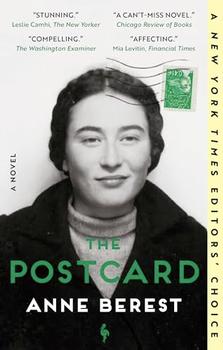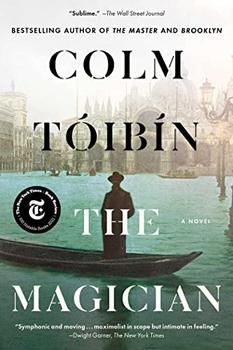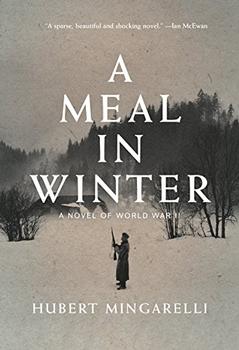Summary | Excerpt | Reading Guide | Reviews | Beyond the book | Read-Alikes | Genres & Themes | Author Bio

Anne Berest's The Postcard — with an elegant translation from the French by Tina Cover — is marketed as a novel about a Jewish family during the German occupation of France but in fact skirts quite close to the line dividing fiction from memoir. Berest applies the narrative liberties afforded by fiction to augment an otherwise accurate account based on well-researched history, family documents and archival sources.
In January 2003, twenty-four-year-old Anne and her sisters are summoned to their parents' Paris home. Lélia, Anne's mother, shows them a postcard that arrived earlier in the week. Written on the unsigned card, in an unfamiliar script, is a short list of names: "Ephraïm, Emma, Noémie, Jacques." These are the names of Lélia's maternal, Rabinovitch grandparents, her aunt, and her uncle. All four died at Auschwitz in 1942. Anne's family is baffled and distressed by the strange postcard. Who could have sent it? And why?
In the chapters that follow, which transform the names listed on the postcard into fully imagined, vital characters, the novel does not adhere to strictly chronological rules. The central story of the Rabinovitch family in occupied France is approached from several directions: the years leading up to the Holocaust as the family flees Russia and makes its way to France via Latvia and British Palestine, and, equally, from the near-present reflecting back. The narrative voice is layered, often one family member recounting pieces of the story to another, reminding the reader that history is a living thing, reanimated through its telling.
Within this layering of time and place, the novel is at once a closely depicted, meticulous account of the lives of the Rabinovitch family and the ways in which their terrible fate has resonated in the lives of their descendants; a fascinating, true-life mystery involving detectives and handwriting analyst, as Anne and her mother investigate the identity of the postcard writer; and a powerful account of the occupation of France and the unfurling, systemic reinforcement of antisemitism through the Vichy government's administrative practices.
In tracing the strategic way that Jews were isolated from full membership in French society, paving the way for public acceptance of their arrests, Berest explains that "they existed in the gray area of indifference." She then follows this with an unsettling question to the reader: "Which victims living in tents, or under overpasses, or in camps way outside the cities are your 'invisible ones'?" The intentional processes by which antisemitism became increasingly normalized within European society are recognizable tactics for the alienation of marginalized groups in today's political arena.
The author also reflects on identity as she explores how inheritances of loss and trauma can realign generational values. For Berest's grandmother, Myriam, the only survivor in her family, "God had died in the death camps." Believing that "her children and grandchildren should be born into a new world, with no links to the old one," Myriam never again entered a synagogue. Berest acknowledges that this movement towards a fully secular life has also been a part of her inheritance. She recognizes that her history is a deep, living thing as she grapples to fully engage with the complex reverberations of her family's virtual erasure: "And that struggle is what constitutes me."
![]() This review was originally published in The BookBrowse Review in June 2023, and has been updated for the
May 2024 edition.
Click here to go to this issue.
This review was originally published in The BookBrowse Review in June 2023, and has been updated for the
May 2024 edition.
Click here to go to this issue.

If you liked The Postcard, try these:

by Colm Toibin
Published 2022
From one of today's most brilliant and beloved novelists, a dazzling, epic family saga centered on the life of Nobel laureate Thomas Mann, spanning a half-century including World War I, the rise of Hitler, World War II, and the Cold War.

by Hubert Mingarelli
Published 2018
A miniature masterpiece, this is the spare, stunning story of three soldiers who share a meal with their Jewish prisoner and face a chilling choice.
People who bite the hand that feeds them usually lick the boot that kicks them
Click Here to find out who said this, as well as discovering other famous literary quotes!
Your guide toexceptional books
BookBrowse seeks out and recommends the best in contemporary fiction and nonfiction—books that not only engage and entertain but also deepen our understanding of ourselves and the world around us.